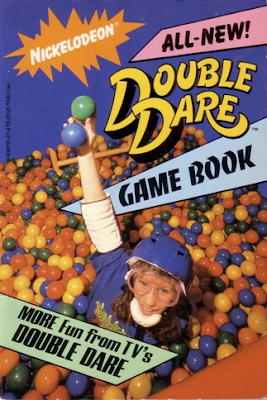Double Dare wasn’t an ordinary "question and answer" show with a simple bonus rounds. The show featured a mix of physical challenges, quizzes and obstacle courses. Getting covered in Nickelodeon's famous slime in any given episode, as well as various other gooey surprises like pies or spaghetti sauce, was all par for the course. Any of these things could leave a participant messy and embarrassed, but also possibly one step closer to earning a huge shopping spree in the toy store of your dreams. Getting to be messy? Huge toy shopping spree? Of course kids wanted to be on this show! (While I would have loved to be on Double Dare myself, my real dream would have been getting to Velcro video games to myself on the final round of Video Power). Even the consolation prizes on these game shows were probably worth the embarrassment. Was getting to cover yourself in fake sundae fixes really all that bad a penalty? It was more like a badge of honor, or something you always wanted to do, anyway - the prizes were just a bonus on top of the fun of getting messy. Being encouraged, in fact, to be messy and make a fool of yourself! The challenges and prizes may have changed over the years, but there were certainly there no shortages of kids ready to sign up and take their chances.
Back to that question, though, of how all this relates to tabletop games? Well... you've got mental challenges. Challenges of physical skills. Obstacle courses. That all certainly sounds like a dungeon crawl to me! If you want something unique or just different in your games, you can draw inspiration from the classic kids' game show of Double Dare (or your own favorite in a similar style). Take a classic example from the show like the "Pick It" challenge. There, players would have to dig around in a replica of a giant human nose to root out a flag. Gross, to be sure... but fun! And you can do something similar in your own games. A simple engraving on a locked door: "To get the treasure this door keeps, the key is searching that which reeks." Description of the room mentions various mud pits, and hints that one might just have the key. Different pits may contain unexpected treasure, leeches, or (literal?) red herrings. As an added bonus, this could also be paired with a trap, such as the classic "spiked wall trap." You’ll be keeping your players engaged and giving their characters a chance to get messy.
 Another thing Double Dare reminds us is that traps in games don't need to be lethal, or even necessarily damaging, in order to add challenge to our adventures. Getting a character covered in slick, sticky, or smelly goo may have other temporary effects to keep things interesting. A gooey character's speed may be lower, or they find it difficult to hold onto items (or, alternately, drop them!), or have trouble with charisma-based skill until they're able to get cleaned off. All fixable in the long run, but it still adds to the challenge of the game, and gives you some new options to make sessions a little different... and players a memorable silly story or in-joke to reference in the future. Of course, before you consider doing any of these things, it's worth considering the tone of your game and your audience's expectations. Are you running a session for kids and trying to pull your punches a little? Are your players into the possibility of slapstick scene to break up the tension? Either of these might be a good time to add a few Double Dare-style traps to your gaming sessions.
Another thing Double Dare reminds us is that traps in games don't need to be lethal, or even necessarily damaging, in order to add challenge to our adventures. Getting a character covered in slick, sticky, or smelly goo may have other temporary effects to keep things interesting. A gooey character's speed may be lower, or they find it difficult to hold onto items (or, alternately, drop them!), or have trouble with charisma-based skill until they're able to get cleaned off. All fixable in the long run, but it still adds to the challenge of the game, and gives you some new options to make sessions a little different... and players a memorable silly story or in-joke to reference in the future. Of course, before you consider doing any of these things, it's worth considering the tone of your game and your audience's expectations. Are you running a session for kids and trying to pull your punches a little? Are your players into the possibility of slapstick scene to break up the tension? Either of these might be a good time to add a few Double Dare-style traps to your gaming sessions.
- A
Send questions, comments, and home slime recipes to neversaydice20@gmail.com or "X-ecute" them @neversaydice2.


